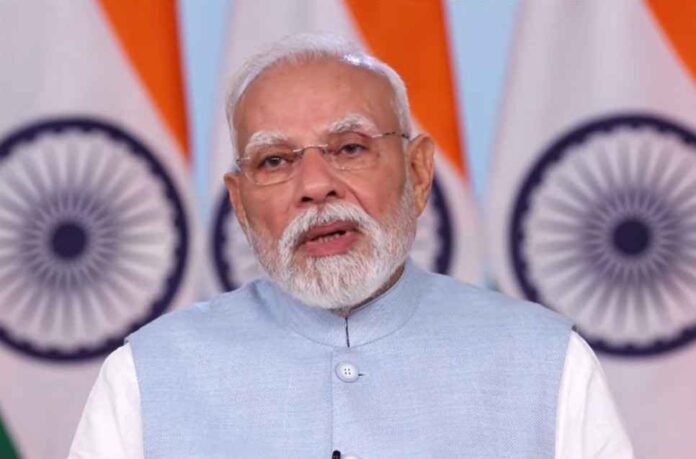New Delhi: Prime Minister Narendra Modi today addressed the nation on the occasion of Navratri, marking the rollout of Next Generation GST reforms from sunrise, September 22. Extending his greetings to citizens, the Prime Minister said the festival of Shakti also coincides with a new chapter in India’s economic reforms, ushering in what he described as a “GST Bachat Utsav” (Savings Festival) across the country.
The reforms, he noted, are designed to directly benefit households, businesses, and industries, ensuring higher savings, simpler taxation, and more affordable essential goods and services.
GST Reforms as a Savings Festival
Calling the new GST structure a “festival of savings,” Prime Minister Modi said the benefits will reach all sections of society—the poor, middle class, neo middle class, farmers, women, traders, and entrepreneurs. “This Navratri, every household will experience greater happiness and sweetness,” he remarked.
The Prime Minister explained that with the new system, only two main slabs—5% and 18%—will remain. Daily-use items including food products, medicines, soaps, toothbrushes, toothpaste, and insurance services will either be tax-free or taxed at just 5%. Of the goods earlier taxed at 12%, nearly 99% have now been brought under the 5% bracket.
“Fulfilling personal dreams will now become easier,” Shri Modi said, noting that home construction, the purchase of televisions, refrigerators, scooters, and cars will cost less. He further highlighted that travel and hospitality expenses will also reduce, as GST on most hotel rooms has been slashed.
According to government estimates, combining income tax relief with GST reductions will result in savings exceeding ₹2.5 lakh crore annually for citizens.
Linking GST with Past Reforms
Recalling the launch of GST in 2017, the Prime Minister said it marked the end of a complex system that for decades had burdened businesses and consumers with multiple levies such as Octroi, Entry Tax, VAT, Excise, and Service Tax.
Sharing a personal memory, he recounted a 2014 news report where a company found it easier to export goods from Bengaluru to Europe and re-import them to Hyderabad than to send them directly due to multiple checkpoints and taxes. “Such was the complexity of our tax system,” he said.
He credited the joint efforts of the Centre and states in making the dream of “One Nation, One Tax” a reality. The new GST reforms, he added, are a continuation of that process, adapting to present-day needs and future aspirations.
Boost for the Poor and Middle Class
The Prime Minister emphasized that while tax reforms in the past have benefitted industry and higher-income groups, these changes are designed especially for the poor and the neo middle class.
This year, income up to ₹12 lakh has been made tax-free, and with reduced GST rates, households now stand to gain doubly. “The middle class and the poor are receiving a double bonanza—first through income tax relief and now through reduced GST,” he said.
He observed that shopkeepers across the country have already begun displaying boards showing price reductions after GST changes, ensuring that benefits are passed on to customers directly.
MSMEs and Self-Reliance at the Core
Prime Minister Modi stressed that India’s micro, small, and medium enterprises (MSMEs) stand to benefit significantly from reduced tax burdens and simplified procedures. He described MSMEs as the backbone of India’s economy, with a historic role in shaping the country’s prosperity.
He underlined that the new GST regime will help small industries boost sales, reduce compliance costs, and compete globally. “Our products must meet the highest global standards. Quality will define India’s identity and prestige,” the Prime Minister said.
Linking the reforms to the larger vision of Aatmanirbhar Bharat, he urged citizens to embrace Swadeshi by purchasing and promoting indigenous products. “Every home should become a symbol of Swadeshi, every shop a showcase of Made-in-India goods,” he said, calling on people to proudly declare, “I buy Swadeshi, I sell Swadeshi.”
Savings of ₹2.5 Lakh Crore for Citizens
The Prime Minister underlined that the combination of reduced GST rates and income tax relief will create substantial financial space for families. “Decisions taken over the past year will result in savings exceeding ₹2.5 lakh crore for the people of India. This is why I call it a ‘Bachat Utsav’,” he said.
He expressed optimism that lower GST will make essentials, consumer goods, and services more affordable, while also boosting domestic consumption and economic growth.
Appeal to States and Citizens
In his concluding remarks, Prime Minister Modi appealed to state governments to actively support Aatmanirbhar Bharat and the Swadeshi movement by promoting manufacturing in their regions. He emphasized that when the Centre and states progress together, India will emerge as a developed nation.
“Let us step into this Navratri with the resolve of savings, self-reliance, and Swadeshi,” he said, extending his best wishes to families across the country for the GST Bachat Utsav and the festive season ahead.
Key Highlights of GST Savings:
- Only two major slabs remain—5% and 18%.
- Daily-use goods like food, medicines, soaps, and insurance taxed at 0–5%.
- 99% of goods previously taxed at 12% now shifted to 5%.
- Income up to ₹12 lakh exempt from income tax.
- Citizens to save over ₹2.5 lakh crore annually.
- Affordable travel and hospitality due to reduced GST on hotels.
- Boost for MSMEs and small-scale industries through lower compliance costs.






